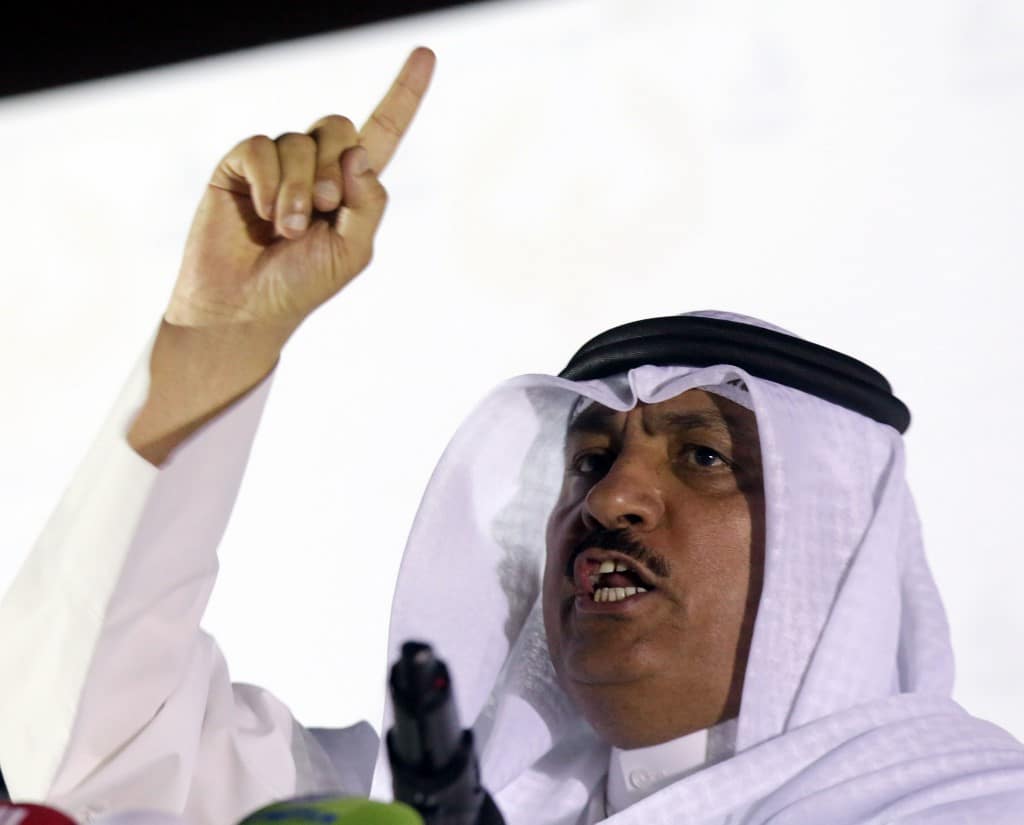
Columnists, politicians, professors—they all publicly criticize the current (2014-2015) state of political affairs in Kuwait on a daily basis, but they never cross the red line: direct criticism of the emir, Sabah al-Ahmed al-Jaber al-Sabah. In October 2012, however, Musallam al-Barrak (born 1956) did just that, saying that Kuwait was becoming an autocratic state. This led to his arrest for insulting the emir and confirmed al-Barrak’s status as Kuwait’s most famous and audacious opposition figure.
As a member of the large al-Mutairi tribe, he is one of the first leading figures of tribal origin, making a contrast with the commercial elites, usually called hadari (merchant families), who have predominated historically. They consider themselves the original settlers of Kuwait and look down on the Bedouins, as they call people of tribal origin, who comprise the majority of the population.
To say that al-Barrak is the opposition figure would thus be a mistake. He represents only a certain part of the Kuwaiti opposition, the marginalized part that believes their time has come to be heard—roughly speaking, the Bedouins, the Shia and the bidoun (stateless Bedouins who never received Kuwaiti citizenship and stand lowest on the social ladder).
Abdulhakim al-Fadhli, defender of human rights and fighter for bidoun rights considers al-Barrak a friend and a fellow leader of a protest movement. “He is a genuine and unique political leader and a very charismatic person.” Al-Fadhli admires his pragmatism. “He is flexible enough to seek advice from people who know, for example, how to mobilize the streets, like me.”
Shafeeq Ghabra, professor of political science at Kuwait University, describes al-Barrak in an article for the Middle East Institute as a “combination of a trade unionist, a charismatic nationalist leader and a politician whose aim is to change peacefully the elite politics of Kuwait into a more democratic, inclusive and open structure.” He should not be considered a moderate or even a secularist, for he is not.
Conservative
Al-Barrak is a conservative who voted—when he was still a member of parliament, a position he lost after boycotting the elections in 2012—for gender segregation in schools and universities and against a bill granting women the right to vote (which nevertheless passed). He has often been accused by the ruling class of having ties with the Muslim Brotherhood and of having accepted a gift of $200 million from Qatar.
Al-Fadhli: “They accuse me of being a Muslim Brother too, and the corruption claim against al-Barrak has never been proven. Don’t forget that the rulers can buy every media outlet they want in order to advertise these kind of accusations. The only real opposition newspaper and TV station were recently shut down.” In July 2014 al-Youm television and Alam al-Youm newspaper, both considered pro-opposition, were indeed closed, officially because they lacked the proper licenses.
This is fine with some: “They are a bunch of desert dwellers, who call themselves opposition. They are proud of their Saudi heritage; need I say more?” Walid Algharabally, a member of one of Kuwait’s merchant families, does not like al-Barrak and his supporters; that much is clear. “If al-Barrak would just say he needs money for the Mutairi tribe, that would be fine with me, but don’t call yourself the opposition.”
That is exactly al-Barrak’s weak point. His opposition is not the only opposition. People like Algharabally are as opposed to the ruling family as is al-Barrak, but they are horrified by the idea that Bedouins might rule the country, leading Kuwait backwards rather than forwards. “The only reason he is popular is that there are so many idiots in this country. But I admit, he is doing a good job for the ruling family.”
That he is doing a good job for the ruling family is an opinion both supporters and opponents seem to share. Political scientist Shafeeq Ghabra says that al-Barrak is a safety valve for the Kuwaiti political system, which Ghabra thinks will have to change, one way or another. “He is among the few in the hard-core opposition power structure that have the credibility to cut a compromise deal with the Sabahs.”
Algharabally does not believe that the Sabahs will strike a deal with him. He thinks al-Barrak is just used as a lightning rod to appease the citizens who are calling for fundamental reforms. “He is used by them to deflate movements that want real change. He is actually paid by the same sheikhs he says he wants to topple.”
Even al-Fadhli agrees that the ruling family is using al-Barrak. “After this emir passes away, they count on infighting within the opposition groups. It is a very mean game.” Whatever the reason, it has been quiet lately around al-Barrak and his opposition movement, which does indeed suffer from internal disagreements. Either al-Barrak is waiting for his chance to strike again, or he has faded away, a pawn in the game of the princes, after all.


